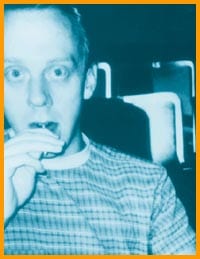I have a bone to pick with Chuck And Buck.
Don’t get me wrong – the story is charming and peppered with complex but fun characters. The performances are strong and, at times, brilliant.
But the fag in me wants to know: How come only the straight guy gets any sexual satisfaction?
Brief synopsis: As kids, Chuck (Chris Weitz) and Buck (Mike White) are best friends. They’ve been out of touch for 15 years, but when Buck’s mother dies, he tracks Chuck down in Los Angeles and invites him to the funeral.
The story takes off when, at the wake, Buck walks in on Chuck having a pee and clumsily grabs his crotch. Appalled, Chuck grabs his bewildered fiancee and heads home.
Undeterred, Buck packs his worldly goods in the back of the station wagon and moves to LA, where he takes to stalking Chuck (gently, mind you).
Buck baldly demands that the two old friends play “one of those games we used to play,” a game affectionately known as Chuck And Buck Suck And Fuck (no doubt you can guess what this involves).
There are a slew of brilliant moments. Buck’s behaviour is often absolutely cringe-inducing, as he doggedly and desperately, crashes through the simplest of social boundaries. The relationship he develops with the manager of a small children’s theatre is as uplifting as it is amusing. His hysteria after his advances are rejected by another man (a Chuck look-a-like named Sam, played by Paul Weitz, Chuck/Chris’s real-life brother) is deeply moving.
But here’s the trouble: each of the main characters has a problem to get past. Buck, trapped as he is in his pre-adolescent past, needs to grow up. And Chuck, terrified of admitting his youthful dalliances with another guy, needs to loosen up. It’s a battle of wills.
Buck finally starts to grow up when he replaces his petulant demands with negotiation: If Chuck comes home with him just once, Buck will stay out of his life forever. Chuck agrees, and he loosens up by finally acknowledging the relationship he shared with Buck when they were younger.
Then Buck disappears out of the frame at the bottom and Chuck closes his eyes: It’s the classic blowjob shot. Cut to Chuck getting dressed and leaving. His final, gentle words to Buck: “You need to grow up.”
The immediate and seemingly unintended result is the perception that Chuck means that Buck should stop wanting to suck dick. We don’t see Chuck disappear from the frame during the sex scene, after all. Chuck is all top – and all grown-up – all the time.
In what follows, there is no further suggestion of Buck’s having any sort of sex drive whatsoever. The movie ends as Buck eats cake to celebrate Chuck’s wedding.
Mike White, who wrote the film and who plays Buck, disagrees with my critique that gay male sexuality is portrayed as childish and invalid.
White, for the record, is smart, funny, and adorable. I’m half-relieved and half-disappointed to discover that he has the shiniest pearly whites I’ve ever seen, in stark contrast with the hilarious, Ren-and-Stimpy-esque extreme close-up that occurs in the film. White, the son of a popular gay clergyman in the US, claimed repeatedly that we’ re all fundamentally bisexual: “That’s been my experience.”
“Buck,” says White, “has reasons that he needs to grow up that have nothing to do with his sexual preference.”
But why is there no sense that Buck gets any satisfaction from the pivotal sex scene? “He does get that satisfaction when Chuck says, ‘I remember you.’ It is a vindication for [Buck] in that moment.”
But that isn’t sexual satisfaction. After this huge struggle, shouldn’t Buck get some kind of release?
White points out that part of growing up, perhaps most acutely around sexual matters, involves understanding that the quenching of a desire does not bring about complete fulfillment.
“Most people, by the time they’re Buck’s age, have replaced that first love object with a million other people or a million other situations, but he’s stayed true to that first thing.”
So Buck learns another lesson – making it with the object of his obsession won’t change his fundamental situation.
I’m willing to believe that Chuck And Buck isn’t trying to tell me that gay sex is an emotionally stunted behaviour. But I can’t shake the feeling that, like so many times before, the film portrays straight sexuality as more normal and desirable.
Chuck And Buck opens Fri, Jul 28 at the Cumberland (159 Cumberland St); call (416) 699-5971.

 Why you can trust Xtra
Why you can trust Xtra


